HealthandOurEarth开心学英语culture1上课讲义
高中英语《Module1Our Body and Healthy Habats》优质教学课件
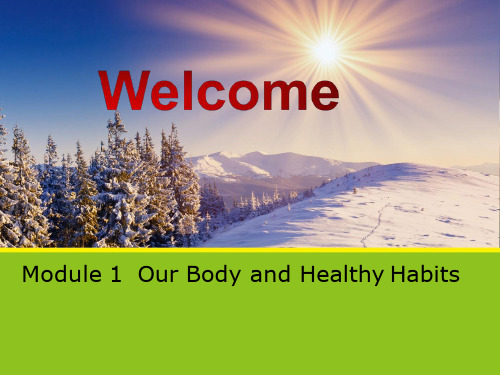
Eating habits
He is so fit because his mother
often makes sure he eathsevaeltrhyil
1
. The importdanietytpartfsreosfhhfrisu2it
habits”.
Some new words
diet rarely proverb anxious painful normal lifestyle
节食 稀少 地谚 语焦 虑的 疼痛的 正常的 生活方 式
Reflection
Fill in the blanks
1. Regular exercise is part of a healthy _lifestyle ( 生活方式 ) 2.The Chinese pr_over_b(谚 语 )says that the longest journey begins with a single step. 3. I'm _anxio_us( 担心 ) about his health. 4. After three exhausting days, we ( 朝hea·d·e·d··方向前进 ) home. 5._Rarel_y( 很少 ) have I seen the beautiful sunset
7. You dislike doing sport.
8. You take exercise less than 2 hours a week.
9. You seldom( 很少 ) take a walk between the classes.
开心学英语五年级上册Unit1Comewithme课件之

The teacher's books provide teachers with detailed information about the courseware and lesson plans, including teaching tips, suggestions for differentiated instruction, and answers to student questions.
Evaluating students' understanding of different cultures and their application in communication.
THANK YOU
感谢观看
Assessment
Assess students' understanding and proficiency through quizzes, tests, or other evaluation methods.
Teaching resources
05
The courseware includes a variety of interactive activities, such as listening comprehension, speaking practice, reading comprehension, grammar exercises, and cultural background information. These activities are designed to engage students in active learning and help them develop their English language skills.
八年级英语culture unit 1 growing up around the world. 人教新目标版知识精讲
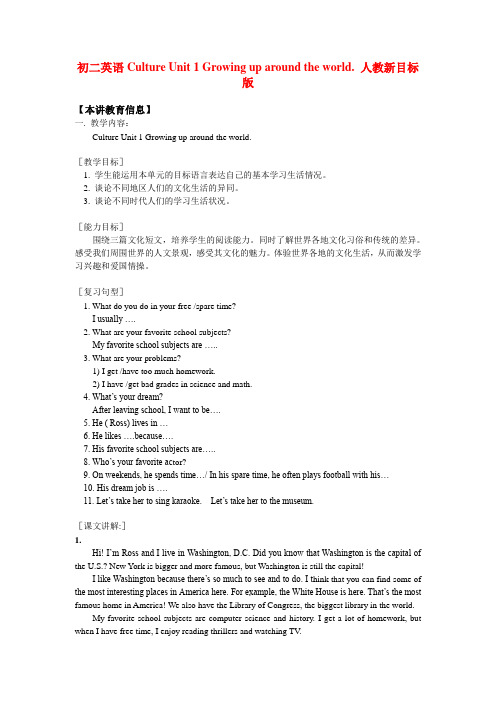
初二英语Culture Unit 1 Growing up around the world.人教新目标版【本讲教育信息】一. 教学内容:Culture Unit 1 Growing up around the world.[教学目标]1. 学生能运用本单元的目标语言表达自己的基本学习生活情况。
2. 谈论不同地区人们的文化生活的异同。
3. 谈论不同时代人们的学习生活状况。
[能力目标]围绕三篇文化短文,培养学生的阅读能力。
同时了解世界各地文化习俗和传统的差异。
感受我们周围世界的人文景观,感受其文化的魅力。
体验世界各地的文化生活,从而激发学习兴趣和爱国情操。
[复习句型]1. What do you do in your free /spare time?I usually ….2. What are your favorite school subjects?My favorite school subjects are …..3. What are your problems?1) I get /have too much homework.2) I have /get bad grades in science and math.4. What’s your dream?After leaving school, I want to be….5. He ( Ross) lives in …6. He likes ….because….7. His favorite school subjects are…..8. Who’s your favorite ac tor?9. On weekends, he spends time…/ In his spare time, he often plays football with his…10. His dream job is ….11. Let’s take her to sing karaoke. Let’s take her to the museum.[课文讲解:]1.Hi! I’m Ross and I live in Washington, D.C. Did you know that Washington is the capital of the U.S.? New York is bigger and more famous, but Washington is still the capital!I like Washington because there’s so much to see and to do. I t hink that you can find some of the most interesting places in America here. For example, the White House is here. That’s the most famous home in America! We also have the Library of Congress, the biggest library in the world.My favorite school subjects are computer science and history. I get a lot of homework, but when I have free time, I enjoy reading thrillers and watching TV.On weekends, I spend time with my family. We often go for walks in one of the large city parks. I also play football with my friends, or we just go to the mall and hang out.When I leave school, I plan to study history. One day, I want to become president and live in the White House!4a.Living in the OutbackNicky Logan is 13 years old, and she comes from the Australian Outback. She lives on a farm with her parents, her brothers Martin and Ben, and 50,000 sheep.The Logan’s farm is in the “outback”. A lot of Australia is “outback”—it’s very hot and dry, and not many people live there. Sometimes Nicky and her family don’t see any other people for weeks.So how do Nicky and her brothers go to school? Well, they don’t go to school — their school comes to them, by radio and the Internet. They sit at home and talk to their teachers and classmates on the radio. Their classmates live on other farms and their teachers work at the “School of the Air”, in a place called Alice Springs. When the pupils have to do homework, they send it to their teachers by fax or the Internet.When Nicky isn’t studying, she likes to ride her horse and help the farm workers with the sheep. It’s hard work for a young girl, but she enjoys it. Sometimes she plays tennis with her brothers, and when it’s very hot, she likes to go swimming in the river on the farm.“I really like living on an outback farm,” says Nicky. “There are some very cool animals like koalas and kangaroos. But not all the animals are cool. There are some dangerous snakes and spiders here. They can be scary!”The “School of the Air” is only for younger students. So next y ear, when Nicky is 14, she has to go to a school in Alice Springs. She is going to live at the school and visit her family during the vacations. “I’m going to miss my parents and my horse,” she says, “but I still want to go. I want to study with other kids for a change.”9a.I had to get up at six o’clock every morning and ride my bike five miles to school. In winter, it was very cold, and in summer it was very hot, but I didn’t mind. I liked to exercise.We wore uniforms to school, not like Canadian kids today. Some of the girls liked their school uniform, but the uniform for boys looked strange. We had to wear ugly straw hats!Our school wasn’t in a very good place. It was next to a train station. Sometimes it was difficult to hear the teacher because of all the trains outside. The school was small, too, and the classrooms were very crowded. There were usually forty or fifty students in every class.There was no TV at that time, so we didn’t know a lot about the world. I remember our geography textbook had beautiful photographs from far away places like India, China, and Africa. Geography was really interesting for kids in those days!Families were poor because it was the time of the Great Depression. I wore my elder brother’s old unifor m. My shoes had holes where you could see my feet. It was terrible!We were poor but we still enjoyed ourselves. I liked to play baseball and ice hockey after class. But we played ice hockey on frozen ponds. Not inside like the kids today.[补充阅读练习]Mind your manners!Around the world, people have different ideas about what good table manners are. In India, for example, people only eat with their right hands. You take food from one dish on the table, usually a kind of bread or rice, mix it with food from another dish and then put it in your mouth. Your left hand stays still. Eating with your left hand is very rude!In western countries, people don’t usually share the same dishes. Everyone has his or her own plate of food. You eat with a knife and fork and you shouldn’t wave them around when you aren’t eating. And you should try not to be noisy when eating. People think that’s bad table manners!When you go to restaurants in different parts of the world, it’s important to know what p eople think is rude. For example, in China it’s OK to be noisy in a restaurant. In fact, if a restaurant isn’t noisy, you may think it’s not very good. However, in many western countries, restaurants are quiet place. If a table is too noisy, other customers might not be happy.Paying for the meal is also different from country to country. In China, one person usually pays for everyone. In western countries, when friends eat together, they usually share the cost. This is called “going Dutch.” Also, when westerners pay the check, they usually leave some money for the waiter. This is called “leaving a tip.” Not leaving a tip is very rude. In the U.S., it’s common to leave tips of 10%, 15%, or 20% of the check. The amount depends on how good the waiter was. Good waiters can get a lot of money!The way people eat food is different around the world, but you can find the same kinds of food in many countries. Chinese and Italian foods, for example, are popular all over the world.【模拟试题】(答题时间:70分钟)一. 对话。
地球脉动PPT课件英语

Objective 3
To develop students' ability to apply their knowledge to real world scenarios through case studies and practical exercises
Overview of the Earth
Epilogue
Course objectives: This course aims to introduce students to the basic concepts of Earth pulse and its applications in various fields, including physiology, volcanology, and paleontology
Loss of biodiversity can lead to a decrease in natural resources, such as food and medicine, and an increase in natural disasters
Measures to protect biodiversity including conservation of natural habitats, protection of extended specifications, and sustainable use of natural resources
Tides
Tides are changes in sea level caused by the gravitational pull of the Moon and Sun on Earth's oceans They result in regular ebbs and flows of water that has a significant impact on marine life and coastal environments
高中英语 Module 1《Our Body and Healthy Habits》cultural

16个健康习惯1.任何时候,不健康的生活习惯都是袭击健康的杀手,而健康习惯那么让生命受益。
所以,健康更取决于习惯,来自于日常生活的点点滴滴。
2.晨起先饮水每天早晨起床,在未进食之前喝一大杯水,对机体既是一次极大的补偿,又是一种有效的净化。
清晨,胃内食物已经排空,新饮进的水约经过21秒钟就能到达身体的每一个角落,促进全身的吐故纳新。
首先,洗涤机体,清除污染,保证细胞的新陈代谢。
其次,滋润机体,避免疾患。
稀释血液,降低血粘度,有效地预防心脏病和中风。
还有助于机体代谢,废物排泄,补充睡眠中随呼吸、汗液等丧失的水分,消除疲劳。
3.吃一顿营养早餐吃一顿优质的早餐可以让人在早晨思考敏锐,反应灵活,并提高学习和工作效率,而且有吃早餐习惯的人比较不容易发胖,记忆力也比较好。
早餐必须具备三项条件:一要有足够水分;二要有足够的能量;三要有足够的蛋白质。
一顿理想的抗压早餐是富含蛋白质、碳水化合物以及纤维的早餐,如由稀饭〔碳水化合物〕、瘦肉或鸡蛋〔蛋白质〕、一个水果或一碟凉拌蔬菜〔纤维素〕构成的早餐。
4.少发脾气根据研究,“敌意〞低的人,血液的带氧腺体数目也会增加,带氧腺体就像高速公路的开道车,可以让人的免疫细胞快速抵达病菌入侵现场。
把坏脾气丢掉,更乐观的面对生活。
研究说明,大笑可以减少压力荷尔蒙。
5.感恩生活多感谢生活给予自己的东西,多帮助他人。
一项针对两千七百名美国社区志工的调查显示,这群人罹患心脏病、忧郁症及传染病的比率,比没有担任志工的人少2~5倍。
做善事之后,脑啡释放的量会提高,从而增加快乐、减少因忧愁造成的压力蛋白。
6.眼睛累了要休息缓解眼睛疲劳的最正确方式是让眼睛休息,方法简单极了:当你打时,如果不需要读什么或者写什么,就把眼睛闭上.眼睑是眼睛最好的按摩师,特意眨眼并转动眼球10次,一天重复假设干次,有助于清洁眼睛并能缓解眼部疲劳。
7.每日多吃蔬果根据调查,多吃蔬菜水果的人,可以减轻癌症与心脏病的风险。
建议你,把蔬果放在最容易看到、随手就可以拿到的地方,提醒自己多吃蔬果,也可以把蔬果切丁,当做点心,代替那些会令你发胖的饼干、零食。
人教版(新起点)Unit5NatureandcultureLesson1课件

4. Which season does Sarah like best?
She likes winter best.
I like _s_u_m_m_e_r_best. It’s very _h_o_t_. But I can _sw__im___ in summer.
I like __f_al_l __ best. The weather is __c_o_ol__. I can __go__h_ik_in_g__ and
Which season do you like best? I like summer best.
Because it’s hot I can
Which season do you like best? I like autumn best.
Because it’s cool I can
Which season do you like best? I like winter best.
autumn cool
winter
cold
看图回答问题。
1. What’s the weather like in winter? It’s cold.
2. Is summer very hot?
Yes, it is.
3. Which season do you like best?
I like spring best.
看图回答问题:
1.Why do you like spring?
Because I can plant trees.
Байду номын сангаас2.Why do you like winter?
Because I can skate.
开心学英语第五册文化单元课件
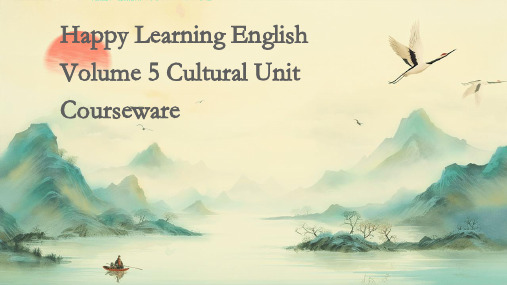
Canadian History and Culture
1. The settlement of Canada
the French, the British, and the Aboriginal people.
2. The Confederation
the unification of British Columbia, Ontario, Quebec, and other provinces into the Dominion of Canada.
03
Vocabulary and expression of cultural
units
Common vocabulary and expressions in daily life
01
02
03
04
Basic greetings: "Hello", "Good morning", "Good
afternoon", "Good evening"
总结词
详细描述
锻炼写作能力
01
02
通过撰写关于英语国家文化的短文,学生可 以锻炼自己的英语写作能力,包括语法、词
汇和表达能力。
总结词
加深文化理解
03
总结词
培养跨文化意识
05
06
04
详细描述
在撰写文章的过程中,学生需要深入 了解英语国家的文化特点、价值观和 传统习俗等,从而加深对英语文化的 理解。
详细描述
总结词
提高文化素养
详细描述
在阅读过程中,学生可以接触到更多的英语词汇和表达 方式,从而扩大自己的词汇量,提高阅读理解和表达能 力。
高中英语Module1OurBodyandHealthyHabitsIntroduction课件

Introduction
fit
Which of the toothache words and health expressions are connected rare with illnesses?
unhealthy
wealthy
get/catch a cold
fit toothache
health
unhealthy
rare
wealthy
get/catch a cold
Pair work:
Tick the sentences that are true for
you.
1. I sometimes get colds and flu. 2. I eat at least three portions of fruit
Introduction
Junk food
Discussion How do you keep healthy?
Conclusion 1:
Take more exercise
Conclusion 2: Have a healthy diet
Conclusion 3: Eat less junk food
6. I eat a lot of sweet things, for example, chocolate. 7. I rarely get toothache. 8. I’m quite fit.
English Proverbs
1. You are what you eat.
Your body and even mental state is
affected by the type of food you eat. 2. Healthy mind in a healthy body. 身体好精神就好。
高教版中职英语基础模块一 Unit1 文化理解和小组活动精美课件

Underline important information about Lu Xun’s three different names in this information board.
在以下简介牌中标出有关鲁迅先生三个不同名字的重要信息。
Lu Xun (鲁迅) was born in September, 1881. His grandfather named him Zhou Zhangshou (周樟寿), which means longevity (长寿). In April, 1898, he became a student in Jiangnan Naval Academy (江南水师学堂). His grandfather’s brother, Zhou Jiaosheng (周椒生), named him Zhou Shuren (周树人). The given name means educating the young. In May, 1918, he published A Madman’s Diary (《狂人日记》) under the now famous pen name Lu Xun. It is said that he chose Lu Xun because Lu is his mother’s family name and Xun means being fast.
Review
live with sb/sth
和某人或某物住在一起
love sb/sth very much 非常爱某人/某物
live in + 地点
居住在某地
be strict with sb
对某人严格
cook /make lunch
一师一优课 课件The Earth
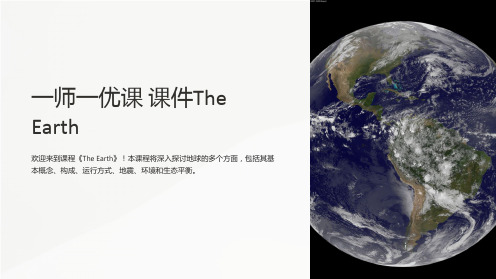
地球的科学探索和未来发展
好奇号火星探测车
好奇号火星探测车是美国宇航局 一项旨在探索一些曾经可以承载 生命的地方的任务。
挑战者海沟
挑战者海沟是世界最深的一条海 沟,其深度为1.5万英尺(约合 4,570米)。
国际空间站
国际空间站是一个超国界的空间 探索项目。自2000年以来,数十 个国家共同运营,并为生物学、 科学、医学等领域做出了重要贡 献。
地球的自转和公转
1
自转
地球的自转是指地球自身绕自身旋转一周的过程。每日自转一周。
2
公转
地球围绕太阳一周的运动轨迹,每年一周。这相当于地球前进约3000亿公里的距离。
3
后果
正是地球自转和公转才让我们有了白昼和黑夜的变化、四季的变化,也让我们有机会探索太 空。
地球的季节变化
秋季
在北半球,秋季通常发生在9月 到12月,并且有着枫叶飞舞的美 景。
一师一优课 课件The Earth
欢迎来到课程《The Earth》!本课程将深入探讨地球的多个方面,包括其基 本概念、构成、运行方式、地震、环境和生态平衡。
地球的基本概念
地球的各层结构
地球由地核、地幔、地壳和大气层等组成,听说地 幔可以拯救整个人类文明?
地球的磁场
地球拥有自己的磁场,保护着我们免受从太空中发 射的高能粒子和射线的侵害。
大气成分
大气层主要由氮气、氧气、水气和氩气等组成,其中氮气为最多的成分, 占据78%,氧气只 占21%。
结构
大气层主要由以下5层组成: 对流层、平流层, 中间层, 外部大气层和国际空间站。
地球的水文循环
1ห้องสมุดไป่ตู้
海洋蒸发
太阳能量使得海洋表面水分子凝结成水蒸气向空气中蒸发。
Unit 1 Culture1

In cultural training workshops we often start by asking participants3:"What does...?"(以......开始)
Page
5
Q3: Will any group or individual come up with identical concept of culture? Why?
cultures.
Page
3
Q2: What is the absolute condition for meaningful interaction in business and management? Social interaction, or meaningful communication, presupposes common ways of processing information among the peoiple in communication.
Page
9
Damen, L. (1987). Culture Learning: The Fifth Dimension on the Language Classroom. Reading, MA: Addison-Wesley. "Culture: learned and shared human patterns or models for living; day- to-day living patterns. these patterns and models pervade all aspects of human social interaction. Culture is mankind's primary adaptive mechanism" (p. 367). Hofstede, G. (1984). National cultures and corporate cultures. In L.A. Samovar & R.E. Porter (Eds.), Communication Between Cultures. Belmont, CA: Wadsworth. "Culture is the collective programming of the mind which distinguishes the members of one category of people from another." (p. 51).
仁爱—《HealtheWorld》《Tellmewhy》教案

《Heal the World》《Tell me why》欣赏课教案教学目标:1.通过学习,唤起学生爱护、关怀和帮助他人的仁爱之心,树立正确的情感态度与价值观,并重视人文关怀。
2.通过对歌曲创作背景的了解,能够让学生了解到战争、贫穷、饥饿对人们的伤害,体会人们祈求和平、友爱、富足的心声。
3.学唱《Amani》部分乐句,唱出对和平的渴望,树立仁爱之心。
教学过程:(一)播放歌曲《Amani》等待上课铃声导入:简单介绍播放《Amani》的原因。
这首歌是在1900年海湾战争后,世界进入了一个短暂的相对和平时期。
Beyond乐队在1911年应世界世界宣明会之邀远赴战火中的非洲,探访第三世界的穷困人民,开始了一段非洲之旅非洲。
当他们看到在战争中的人们是那么贫穷、痛苦和对和平的渴望,便创作了这首《Amani》,抒发了对战后和平长久的渴望,也警示了人们必须要以自已的努力斗争来争取和平,一味地求助于神灵是不行的。
“AMANI”是和平的意思;“ NAKUPENDA NAKUPENDA WEWE”就是“我们爱你”“TUNE TAKE WE WE”是“我们需要你”的意思。
导入新课:就在Beyond乐队创作这首和平之歌的同时,迈克尔.杰克逊也在1991年为自己的同名慈善组织创作了一首充满仁爱呼唤世界和平的歌曲《Heal the World》希望通过慈善募捐,改善那些饱受战火和硝烟困扰的第三世界国家儿童的生活。
(二)观看迈克尔.杰克逊演唱《Heal the World》的视频并提问学生观看次视频的感想。
1.在视频中你看到了什么?2.你觉得在充满硝烟中生活的孩子他们心中最想要的什么?(引导学生通过士兵和硝烟、小孩和笑容等画面,体验歌曲中呼唤让战争远离,让人家充满关爱、和平的情感及仁爱之心)。
(三)再次聆听迈克尔.杰克逊演唱《Heal the World》回答以下问题。
提问:1.这首歌由几个乐段组成?(ABC三个乐段组成)2.这首歌曲表达的感情是怎样的?(表达了人们渴望爱及对世界和平的向往,希望世界充满温暖和关爱)3.聆听后你心里感受又是怎么样的?(为那些饱受战火和硝烟摧残的第三世界国家儿童生活的担忧,真诚呼唤让战争远离,让世界充满关爱与和平)(四)欣赏完这首由迈克尔.杰克逊演唱的充满温暖和关怀并被誉为世界上最动听的歌之一的《Heal the World》后让我们再一起来欣赏另一首由年仅十岁的天籁童声Declan Galbraith以清纯完美的声音演绎的充满忧郁而愤怒的呐喊与呼唤--《Tell mewhy》播放音乐视频提出疑问:1.视频中的演唱者他的情绪是怎么样的?( 疑惑忧郁愤怒呐喊…)2.你觉得他的演唱方式和他身后的图片是想向我表达怎样的感情?(对战争所产生的困惑与无奈,希望和平、快乐与富足)(五)再次聆听歌曲《Tell me why》回答问题提问:1.演唱者连续使用呐喊式的“Tell me why”是想表达什么?(人们对战争、贫穷、饥饿,人与自然、人与人之间冷漠关系的种种困惑,充满忧郁而愤怒的呐喊与呼唤,希望人类和平、友爱、富足的心声)2.它与《Heal the World》所表达的情感是否有相同之处?(都是充满仁爱之情,希望世界和平,人类生活美好)(六)拓展:观看图片学唱《Amani》部分乐句,用歌声唱出希望和平的心声。
health健康话题课件
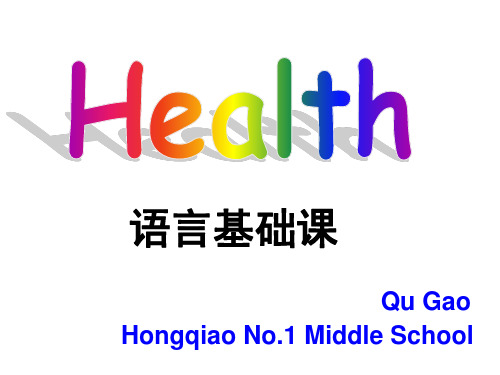
1. watch your diet
2.take exercise
How to be healthy
3.relax yourself
Book 7(上) Unit 6
Do you like bananas?
Book 7(下) Unit 8
Book 8(上) Unit 1
I’d like some noodles.
考试链接
8A Unit1
• …but I’m pretty healthy. I exercise every day, usually when I come home from school. 准描述 分数档 My标 eating habits are pretty good. I try to a lot of vegetables. I eat fruit and drink 2分 eat 朗读流畅,整体语音面貌佳,基本没有发音错误。 milk every day. I never drink coffee. Of 1.5分course, 朗读流畅,整体语音略有问题,发音错误少于 20 处。 I love junk food too, and I eat it two times a week. Oh, and I sleep nine 1分 or three 朗读有停顿,整体语音不佳,发音错误 20处以上。 every night. So you see, I look after 0.5分hours 朗读断断续续,整体语音基本不准,发音错误非常多。 my health. And my healthy lifestyle helps me get good grades. Good food and exercise 0分 help me to study better. 不读。
